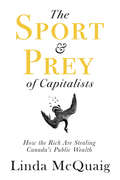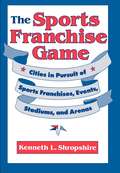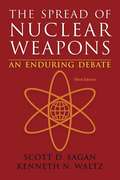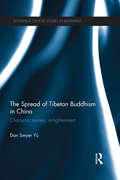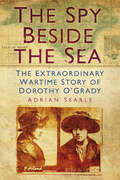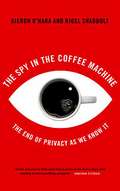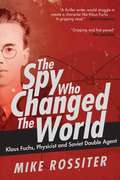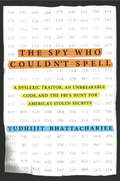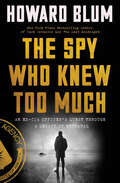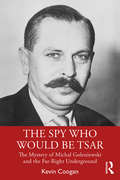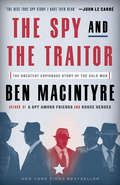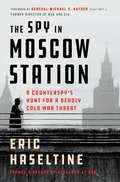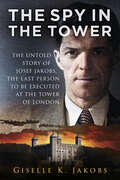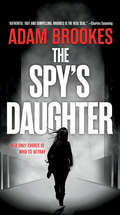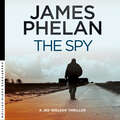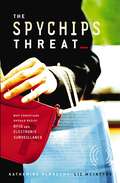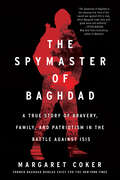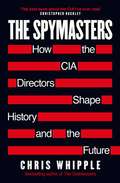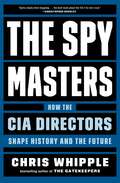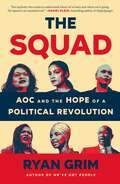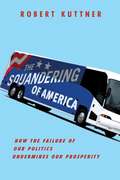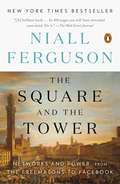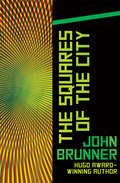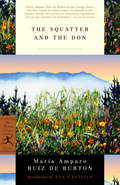- Table View
- List View
The Sport and Prey of Capitalists: How the Rich Are Stealing Canada’s Public Wealth
by Linda McQuaigWhy are we selling off the impressive public enterprises we often battled as a nation to create? In the early 1900s, thousands of Canadians battled wealthy interests, winning control of Niagara Falls and creating a public power company. Another popular movement succeeded in creating Canada’s public broadcasting system to counter American dominance of the airwaves. And a Canadian doctor established a publicly owned laboratory that saved countless lives by producing affordable medications, contributing to medical breakthroughs and helping to eradicate smallpox throughout the world. But in recent decades, we have allowed our inspiring public enterprises to be privatized and our vital public programs downsized, leaving us increasingly dominated by the forces of private greed that rule the marketplace. In The Sport and Prey of Capitalists, Linda McQuaig challenges the dogma of privatization, which has defined our political era. She argues that now more than ever, as we grapple with climate change and income inequality, we need to expand, not shrink, our public sphere.
The Sports Franchise Game
by Kenneth L. ShropshirePower, prestige, and millions of dollars--these are the stakes in the sports franchise game. In this book, sports attorney Kenneth Shropshire describes the franchise warfare that pits city against city in the fierce bidding competition to capture major league teams. Rigorous research, fascinating interviews with major players, stories behind the headlines, and an insider's perspective converge in this rare view of the business side of professional sports. Shropshire portrays a complex web of motivations, negotiations, and public relations, and discusses examples from Philadelphia, the Bay Area, and Washington D.C.
The Spread Of Nuclear Weapons: An Enduring Debate (Third Edition)
by Kenneth N. Waltz Scott Douglas SaganOver the past fifteen years, The Spread of Nuclear Weapons has been a staple in International Relations courses because of its brevity and crystal-clear explanations. The new edition, An Enduring Debate, continues the important discussion of nuclear proliferation and the dangers of a nuclear-armed world. With new chapters on the questions surrounding a nuclear North Korea, Iran, and Iraq and the potential for a world free of nuclear weapons, this Third Edition will continue to generate a lively classroom experience.
The Spread of Tibetan Buddhism in China: Charisma, Money, Enlightenment (Routledge Critical Studies in Buddhism)
by Dan Smyer YuFocusing on contemporary Tibetan Buddhist revivals in the Tibetan regions of the Sichuan and Qinghai Provinces in China, this book explores the intricate entanglements of the Buddhist revivals with cultural identity, state ideology, and popular imagination of Tibetan Buddhist spirituality in contemporary China. In turn, the author explores the broader socio-cultural implications of such revivals. Based on detailed cross-regional ethnographic work, the book demonstrates that the revival of Tibetan Buddhism in contemporary China is intimately bound with both the affirming and negating forces of globalization, modernity, and politics of religion, indigenous identity reclamation, and the market economy. The analysis highlights the multidimensionality of Tibetan Buddhism in relation to different religious, cultural, and political constituencies of China. By recognizing the greater contexts of China’s politics of religion and of the global status of Tibetan Buddhism, this book presents an argument that the revival of Tibetan Buddhism is not an isolated event limited merely to Tibetan regions; instead, it is a result of the intersection of both local and global transformative changes. The book is a useful contribution to students and scholars of Asian religion and Chinese studies.
The Spy Beside the Sea: The Extraordinary Wartime Story of Dorothy O'Grady
by Adrian SearleDorothy O’Grady is uniquely placed in the annals of espionage. She was the first Briton condemned to death under the Treachery Act of 1940 after she was frequently spotted on the outskirts of Sandown (a prohibited area on the Isle of Wight), insisting time and again that her dog had strayed. Had her appeal not saved her from the gallows, she would have been the only woman of any nationality to suffer death under the Act during the Second World War – indeed, the only woman to be executed in Britain for spying in the 20th century. Yet the full story of her extraordinary brush with notoriety and its enduring legacy has never been told, despite the fact that it has more than once dominated the front pages of the British press and inspired both a BBC radio drama and a novel. Now, with the benefit of access to previously classified documents, the truth underpinning the O’Grady legend can finally be revealed. Following her appeal she served nine years in prison for her wartime crimes – but was she really a spy in the employ of Germany? Or was O'Grady, as she insisted years later, a self-seeking tease who committed her apparent treachery ‘for a giggle’? Or was there some other motivation which drove her to wartime infamy in a case which reverberated around the world? In The Spy Beside the Sea, author and journalist Adrian Searle examines all the evidence to reach a disturbing conclusion.
The Spy In The Coffee Machine: The End of Privacy as We Know It
by Kieron O'Hara Nigel ShadboltWhat do you know about the new surveillance state that has been created in the wake of pervasive computing - that is, the increasing use of very small and simple computers in all sorts of host - from your computer to your coat? Well, these little computers can communicate via the web and form powerful networks whose emergent behaviour can be very complex, intelligent, and invasive. The question is: how much of an infringement on privacy are they? Could these intelligent networks be used by governments, criminals or terrorists to undermine privacy or commit crimes? From CCTVs to blogging, from cookies to RFID tags, we are sleepwalking into a new state of global hypersurveillance. And when even cans of Coke are connected to the internet, the risk of someone misusing this information is very high indeed. Kieron O'Hara is Senior Research Fellow in Electronics and Computer Science at the University of Southampton, UK. Nigel Shadbolt is Professor of Artificial Intelligence at the University of Southampton, UK, and was President of the British Computer Society in 2006-7.
The Spy Who Changed the World: Klaus Fuchs, Physicist and Soviet Double Agent
by Mike RossiterThe incredible true story of a British physicist who was an undercover spy for the Soviets. The world first heard of Klaus Fuchs, the head of theoretical physics at the British Research Establishment at Harwell in February 1950 when he appeared at the Old Bailey, accused of passing secrets to the Soviet Union. For over sixty years disinformation and lies surrounded the story of Klaus Fuchs as the Governments of Britain, the United States and Russia all tried to cover up the truth about his treachery. Piecing together the story from archives in Britain, the United States, Russia and Germany, The Spy Who Changed the World unravels the truth about Fuchs and reveals for the first time his long career of espionage. It proves that he played a pivotal role in Britain's bomb program in the race to keep up with the United States in the atomic age, and that he revealed vital secrets about the atom bomb, as well as the immensely destructive hydrogen bomb to the Soviet Government. It is a dramatic tale of clandestine meetings, deadly secrets, family entanglements and illicit love affairs, all set against the tumultuous years from the rise of Hitler to the start of the Cold War.
The Spy Who Couldn't Spell: A Dyslexic Traitor, an Unbreakable Code, and the FBI's Hunt for America's Stolen Secrets
by Yudhijit BhattacharjeeThe thrilling, true-life account of the FBI's hunt for the ingenious traitor Brian Regan--known as the Spy Who Couldn't Spell. Before Edward Snowden's infamous data breach, the largest theft of government secrets was committed by an ingenious traitor whose intricate espionage scheme and complex system of coded messages were made even more baffling by his dyslexia. His name is Brian Regan, but he came to be known as The Spy Who Couldn't Spell. In December of 2000, FBI Special Agent Steven Carr of the bureau's Washington, D.C., office received a package from FBI New York: a series of coded letters from an anonymous sender to the Libyan consulate, offering to sell classified United States intelligence. The offer, and the threat, were all too real. A self-proclaimed CIA analyst with top secret clearance had information about U.S. reconnaissance satellites, air defense systems, weapons depots, munitions factories, and underground bunkers throughout the Middle East. Rooting out the traitor would not be easy, but certain clues suggested a government agent with a military background, a family, and a dire need for money. Leading a diligent team of investigators and code breakers, Carr spent years hunting down a dangerous spy and his cache of stolen secrets. In this fast-paced true-life spy thriller, Yudhijit Bhattacharjee reveals how the FBI unraveled Regan's strange web of codes to build a case against a man who nearly collapsed America's military security.INCLUDES PHOTOGRAPHS
The Spy Who Couldn't Spell: A Dyslexic Traitor, an Unbreakable Code, and the FBI's Hunt for America's Stolen Secrets
by Yudhijit BhattacharjeeThe thrilling, true-life account of the FBI’s hunt for the ingenious traitor Brian Regan—known as the Spy Who Couldn’t Spell. Before Edward Snowden’s infamous data breach, the largest theft of government secrets was committed by an ingenious traitor whose intricate espionage scheme and complex system of coded messages were made even more baffling by his dyslexia. His name is Brian Regan, but he came to be known as The Spy Who Couldn’t Spell. In December of 2000, FBI Special Agent Steven Carr of the bureau’s Washington, D.C., office received a package from FBI New York: a series of coded letters from an anonymous sender to the Libyan consulate, offering to sell classified United States intelligence. The offer, and the threat, were all too real. A self-proclaimed CIA analyst with top secret clearance had information about U.S. reconnaissance satellites, air defense systems, weapons depots, munitions factories, and underground bunkers throughout the Middle East. Rooting out the traitor would not be easy, but certain clues suggested a government agent with a military background, a family, and a dire need for money. Leading a diligent team of investigators and code breakers, Carr spent years hunting down a dangerous spy and his cache of stolen secrets. In this fast-paced true-life spy thriller, Yudhijit Bhattacharjee reveals how the FBI unraveled Regan’s strange web of codes to build a case against a man who nearly collapsed America's military security.INCLUDES PHOTOGRAPHS
The Spy Who Knew Too Much: An Ex-CIA Officer's Quest Through a Legacy of Betrayal
by Howard Blum“Howard Blum writes history books that read like thrillers.”—New York TimesA retired spy gets back into the game to solve a perplexing case—and reconcile with his daughter, a CIA officer who married into the very family that derailed his own CIA career—in this compulsive true-life tale of vindication and redemption, filled with drama, intrigue, and mystery from the New York Times bestselling author of The Last Goodnight, It’s a real-life thriller whose stunning conclusion will make headline news. On a sunlit morning in September 1978, a sloop drifts aimlessly across the Chesapeake Bay. The cabin reveals signs of a struggle, and “classified” documents, live 9 mm cartridges, and a top-secret “burst” satellite communications transmitter are discovered aboard. But where is the boat’s owner, former CIA officer John Paisley? One man may hold the key to finding out. Tennent “Pete” Bagley was once a rising star in America’s spy aristocracy, and many expected he’d eventually become CIA director. But the star that burned so brightly exploded when Bagley—who suspected a mole had burrowed deep into the agency’s core—was believed himself to be the mole. After a year-long investigation, Bagley was finally exonerated, but the accusations tarnished his reputation and tainted his career. When Bagley’s daughter Christina, a CIA analyst, married another intelligence officer who was the son of the man who had played a key role in the investigation into Bagley, it caused a painful rift between the two. But then came Paisley’s strange death. A murder? Suicide? Or something else? Pete, now a retired spy, launches his own investigation that takes him deep into his own past and his own longtime hunt for a mole. What follows is a relentless pursuit to solve a spy story—and an inspiring tale of a man reclaiming his reputation and his family. It’s a very personal quest that leads to a shocking conclusion.The Spy Who Knew Too Much includes 8 pages of black-and-white photographs.
The Spy Who Would Be Tsar: The Mystery of Michal Goleniewski and the Far-Right Underground
by Kevin CooganMichal Goleniewski was one of the Cold War’s most important spies but has been overlooked in the vast literature on the intelligence battles between the Western Powers and the Soviet Bloc. Renowned investigative journalist Kevin Coogan reveals Goleniewski's extraordinary story for the first time in this biography. Goleniewski rose to be a senior officer in the Polish intelligence service, a position which gave him access to both Polish and Russian secrets. Disillusioned with the Soviet Bloc, he made contact with the CIA, sending them letters containing significant intelligence. He then decided to defect and fled to America in 1961 via an elaborate escape plan in Berlin. His revelations led to the exposure of several important Soviet spies in the West including the Portland spy ring in the UK, the MI6 traitor George Blake, and a spy high up in the West German intelligence service. Despite these hugely important contributions to the Cold War, Goleniewski would later be abandoned by the CIA after he made the outrageous claim that he was actually Tsarevich Alexei Nikolaevich of Russia – the last remaining member of the Romanov Russian royal family and therefore entitled to the lost treasures of the Tsar. Goleniewski's increasingly fantastical claims led to him becoming embroiled in a bizarre demi-monde of Russian exiles, anti-communist fanatics, right-wing extremists and chivalric orders with deep historical roots in America's racist and antisemitic underground. This fascinating and revelatory biography will be of interest to students and researchers of the Cold War, intelligence history and right-wing extremism as well as general readers with an interest in these intriguing subjects.
The Spy and the Traitor: The Greatest Espionage Story of the Cold War
by Ben MacintyreNEW YORK TIMES BESTSELLER • The celebrated author of Double Cross and Rogue Heroes returns with a thrilling Americans-era tale of Oleg Gordievsky, the Russian whose secret work helped hasten the end of the Cold War.&“The best true spy story I have ever read.&”—JOHN LE CARRÉNamed a Best Book of the Year by The Economist • Shortlisted for the Bailie Giffords Prize in Nonfiction If anyone could be considered a Russian counterpart to the infamous British double-agent Kim Philby, it was Oleg Gordievsky. The son of two KGB agents and the product of the best Soviet institutions, the savvy, sophisticated Gordievsky grew to see his nation's communism as both criminal and philistine. He took his first posting for Russian intelligence in 1968 and eventually became the Soviet Union's top man in London, but from 1973 on he was secretly working for MI6. For nearly a decade, as the Cold War reached its twilight, Gordievsky helped the West turn the tables on the KGB, exposing Russian spies and helping to foil countless intelligence plots, as the Soviet leadership grew increasingly paranoid at the United States's nuclear first-strike capabilities and brought the world closer to the brink of war. Desperate to keep the circle of trust close, MI6 never revealed Gordievsky's name to its counterparts in the CIA, which in turn grew obsessed with figuring out the identity of Britain's obviously top-level source. Their obsession ultimately doomed Gordievsky: the CIA officer assigned to identify him was none other than Aldrich Ames, the man who would become infamous for secretly spying for the Soviets. Unfolding the delicious three-way gamesmanship between America, Britain, and the Soviet Union, and culminating in the gripping cinematic beat-by-beat of Gordievsky's nail-biting escape from Moscow in 1985, Ben Macintyre's latest may be his best yet. Like the greatest novels of John le Carré, it brings readers deep into a world of treachery and betrayal, where the lines bleed between the personal and the professional, and one man's hatred of communism had the power to change the future of nations.
The Spy in Moscow Station: A Counterspy's Hunt for a Deadly Cold War Threat
by Eric HaseltineThe thrilling, true story of the race to find a leak in the United States Embassy in Moscow—before more American assets are rounded up and killed. Foreword by Gen. Michael V. Hayden (Retd.), Former Director of NSA & CIAIn the late 1970s, the National Security Agency still did not officially exist—those in the know referred to it dryly as the No Such Agency. So why, when NSA engineer Charles Gandy filed for a visa to visit Moscow, did the Russian Foreign Ministry assert with confidence that he was a spy? Outsmarting honey traps and encroaching deep enough into enemy territory to perform complicated technical investigations, Gandy accomplished his mission in Russia, but discovered more than State and CIA wanted him to know. Eric Haseltine's The Spy in Moscow Station tells of a time when—much like today—Russian spycraft had proven itself far beyond the best technology the U.S. had to offer. The perils of American arrogance mixed with bureaucratic infighting left the country unspeakably vulnerable to ultra-sophisticated Russian electronic surveillance and espionage.This is the true story of unorthodox, underdog intelligence officers who fought an uphill battle against their own government to prove that the KGB had pulled off the most devastating penetration of U.S. national security in history. If you think "The Americans" isn't riveting enough, you'll love this toe-curling nonfiction thriller.
The Spy in the Tower: The Untold Story of Joseph Jakobs, the Last Person to be Executed in the Tower of London
by Giselle JakobsA family man who ran afoul of the Nazis, Josef Jakobs was ill-prepared for an espionage mission to England. Captured by the Home Guard after breaking his ankle, Josef was interrogated at Camp 020, before being prosecuted under the Treachery Act 1940 and executed on 15 August 1941.An open and shut case? MI5’s files suggest otherwise.Faced with the threat of a German invasion in 1940/41, MI5 used promises and threats to break enemy agents, extract intelligence and turn some into double agents, challenging the validity of the ‘voluntary’ confessions used to prosecute captured spies. But, more than that – was Josef set up to fail? Was he a sacrifice to test the double-cross system?The Spy in the Tower tells the untold story of one of Nazi Germany’s failed agents, and calls into question the legitimacy of Britain’s wartime espionage trials and the success of its double-cross system.
The Spy's Daughter
by Adam BrookesThe thrilling third novel from multi-award-nominated author Adam Brookes is paranoid, tense spy fiction at its very finest. Meet Pearl Tao: an American girl with a lethal secret.Pearl longs for the life of a normal American teenager: summers at the pool, friends, backyard barbecues in the Washington DC suburbs. But she is different.Her gift for mathematics means overprotective parents and college sponsorship from a secretive technology corporation. And now, aged nineteen, she is beginning to understand what her parents intend for her. The terrifying role she is to play. Her only hope of escape lies with two sidelined and discredited spies: Trish Patterson and Philip Mangan. Finding out the truth about Pearl will be the biggest mission they'll ever undertake."Authentic, taut and compelling. Brookes is the real deal."Charles Cumming
The Spy: The Jed Walker Series Book 1 (The Jed Walker series #1)
by James PhelanA sinister group – code-named Zodiac – has launched devastating global attacks. Twelve targets across the world, twelve code-named missions. Operating distinct sleeper cells, they are the ultimate terrorist organisation, watching and waiting for a precise attack to activate the next group. It is a frightening and deadly efficient way to stay one step ahead. And cause the most chaos. For ex-CIA operative Jed Walker, chaos is his profession. On the outer, burned by his former agency, he is determined to clear his name. Stopping Zodiac is the only way. Desperate to catch the killers and find the mastermind, he can't afford to lose the next lead, but that means that sometimes the terrorists have to win. Ultimately, it all comes down to Walker: he's the only one who can break the chain and put the group to sleep . . . permanently. It's exactly eighty-one hours until deadline.
The Spychips Threat: Why Christians Should Resist RFID and Electronic Surveillance
by Katherine AlbrechtEver feel like you're being watched? This eye-opening book shows how a new technology may soon track your every move . . . and pave the way for the fulfillment of end-time biblical prophecy.A revolutionary technology called RFID (Radio Frequency IDentification) is poised to expose our habits, secrets, and slip-ups to money-hungry marketers, savvy criminals, and government snoops. One day soon, our shoes could keep track of our footsteps. Stores could ID us as we walk in the door. Hidden "tracking units" could log even our restroom visits.Global corporations and government agencies have already invested millions in a plan that uses tiny microchips to uniquely number and track everyday items. Parts of this Orwellian vision are uncannily similar to the prophesies of Revelation. Chipping inanimate objects is just the start-the endpoint is a form of RFID that can be injected into the flesh. This work-an updated version of Katherine Albrecht and Liz McIntyre's controversial and award-winning book Spychips-is a clarion call to Christians to take a stand against plans to monitor and control people through this unnerving new technology.Using public records, real-world examples, and biblical prophesies, Albrecht and McIntyre uncover the frightening story behind RFID and show us how to protect our privacy and civil liberties while there's still time.
The Spymaster of Baghdad: A True Story of Bravery, Family, and Patriotism in the Battle against ISIS
by Margaret CokerFrom the former New York Times bureau chief in Baghdad comes the gripping and heroic story of an elite, top-secret team of unlikely spies who triumphed over ISIS. The Spymaster of Baghdad tells the dramatic yet intimate account of how a covert Iraqi intelligence unit called “the Falcons” came together against all odds to defeat ISIS. The Falcons, comprising ordinary men with little conventional espionage background, infiltrated the world’s most powerful terrorist organization, ultimately turning the tide of war against the terrorist group and bringing safety to millions of Iraqis and the broader world. Centered around the relationship between two brothers, Harith al-Sudani, a rudderless college dropout who was recruited to the Falcons by his all-star younger brother Munaf, and their eponymous unit commander Abu Ali, The Spymaster of Baghdad follows their emotional journey as Harith volunteers for the most dangerous mission imaginable. With piercing lyricism and thrilling prose, Coker’s deeply-reported account interweaves heartfelt portraits of these and other unforgettable characters as they navigate the streets of war-torn Baghdad and perform heroic feats of cunning and courage.The Falcons’ path crosses with that of Abrar, a young, radicalized university student who, after being snubbed by the head of the Islamic State’s chemical weapons program, plots her own attack. At the near-final moment, the Falcons intercept Abrar’s deadly plan to poison Baghdad’s drinking water and arrest her in the middle of the night—just one of many covert counterterrorism operations revealed for the first time in the book. Ultimately, The Spymaster of Baghdad is a page-turning account of wartime espionage in which ordinary people make extraordinary sacrifices for the greater good. Challenging our perceptions of terrorism and counterterrorism, war and peace, Iraq and the wider Middle East, American occupation and foreign intervention, The Spymaster of Baghdad is a testament to the power of personal choice and individual action to change the course of history—in a time when we need such stories more than ever.
The Spymasters: How The Cia Directors Shape History And The Future
by Chris WhippleFrom the New York Times bestselling author of The Gatekeepers, a remarkable, behind-the-scenes look at what it's like to run the world's most powerful intelligence agency, and how the CIA is often a crucial counterforce against presidents threatening to overstep the powers of their office. Only 11 men and one woman are alive today who have made the life-and-death decisions that come with running the world's most powerful and influential intelligence service. With unprecedented, deep access to nearly all these individuals, Chris Whipple tells the story of an agency that answers to the United States president, but whose activities — spying, espionage, and covert action — take place on every continent. At pivotal moments, the CIA acts as a brake on rogue presidents, starting in the mid-seventies with DCI Richard Helms&’ refusal to conceal Richard Nixon&’s criminality and continuing recently as the actions of a CIA whistleblower ignited impeachment proceedings against Donald Trump. Since its inception in 1947, the Central Intelligence Agency has been a powerful player on the world stage, operating largely in the shadows to protect American interests. For The Spymasters, Whipple conducted extensive, exclusive interviews with nearly every living CIA director, pulling back the curtain on the world's elite spy agency and showing how the CIA partners — or clashes — with counterparts in Britain, France, Germany, Israel, Jordan, Saudi Arabia and Russia. Topics covered in the book include attempts by presidents to use the agency for their own ends; simmering problems in the Middle East and Asia; rogue nuclear threats; and cyberwarfare. The Spymasters recounts seven decades of CIA activity and elicits predictions about the issues — and threats — that will engage the attention of future operatives and analysts. Including eye-opening interviews with George Tenet, John Brennan, Leon Panetta and David Petraeus, as well as those who've just recently departed the agency, this is a timely, essential and important contribution to current events.
The Spymasters: How the CIA Directors Shape History and the Future
by Chris WhippleFrom the New York Times bestselling author of The Gatekeepers, a remarkable, behind-the-scenes look at what it’s like to run the world’s most powerful intelligence agency, and how the CIA is often a crucial counterforce against presidents threatening to overstep the powers of their office. <p><p> Only eleven men and one woman are alive today who have made the life-and-death decisions that come with running the world’s most powerful and influential intelligence service. With unprecedented, deep access to nearly all these individuals plus several of their predecessors, Chris Whipple tells the story of an agency that answers to the United States president alone, but whose activities—spying, espionage, and covert action—take place on every continent. At pivotal moments, the CIA acts as a brake on rogue presidents, starting in the mid-seventies with DCI Richard Helms’s refusal to conceal Richard Nixon’s criminality and continuing to the present as the actions of a CIA whistleblower have ignited impeachment proceedings against Donald Trump. <p> Since its inception in 1947, the Central Intelligence Agency has been a powerful player on the world stage, operating largely in the shadows to protect American interests. For The Spymasters, Whipple conducted extensive, exclusive interviews with nearly every living CIA director, pulling back the curtain on the world’s elite spy agencies and showing how the CIA partners—or clashes—with counterparts in Britain, France, Germany, Israel, Jordan, Saudi Arabia, and Russia. Topics covered in the book include attempts by presidents to use the agency for their own ends; simmering problems in the Middle East and Asia; rogue nuclear threats; and cyberwarfare. <p> A revelatory, behind-the-scenes look, The Spymasters recounts seven decades of CIA activity and elicits predictions about the issues—and threats—that will engage the attention of future operatives and analysts. Including eye-opening interviews with George Tenet, John Brennan, Leon Panetta, and David Petraeus, as well as those who’ve just recently departed the agency, this is a timely, essential, and important contribution to current events.
The Squad: AOC and the Hope of a Political Revolution
by Ryan GrimSemafor's Best Political Book of 2023A riveting insider account of the progressive movement in Congress centering A.O.C., Rashida Tlaib, Jamaal Bowman, Cori Bush, Ayanna Pressley, and Ilhan Omar—their rise, their efforts to set an ambitious agenda for the country, and their struggle to find their footing within the Democratic party. The Squad is the definitive, must-read book about the most exciting figures defining our new era. The story is urgent, and the stakes are high—for the country and the world—and Grim, an experienced political reporter who covered the Squad before they were the Squad, is uniquely qualified to tell it.When Bernie Sanders, an obscure Vermont senator, launched his quixotic 2016 presidential campaign, few could have seen just how radically the Democratic Party would transform in just a few short years—or that such a transformation could be led by a Bronx bartender volunteering for Bernie in her spare time. The world as it was when that campaign began is almost unrecognizable today, and the Squad has both shaped and been shaped by the seismic social, cultural, and political changes underway.Referred to informally as the Squad, led by the preternaturally politically savvy Alexandria Ocasio-Cortez, the group laid down a marker for an aggressive left-wing agenda. Grim takes you behind the scenes as that new energy makes impact with Washington, and the Squad spends as much time fending off assaults from Donald Trump—who regularly singled them out and led chants of “send them back” at rallies—as they did battling their own party’s sclerotic leadership. As they’ve grown in office, they’ve had to contend with the eternal question that confronts outsiders who power their way into the inside: Are they still radical organizers willing and able to lead a political revolution?
The Squandering of America: How the Failure of Our Politics Undermines Our Prosperity
by Robert KuttnerThe incomes of most Americans today are static or declining. Tens of millions of workers are newly vulnerable to layoffs and outsourcing. Health care and retirement burdens are increasingly being shifted from employers to individuals. Two-income families find they are working longer hours for lower wages, with decreased social support. As wealth has become more concentrated, the economy has become more recklessly speculative, jeopardizing not only the prospects of ordinary Americans, but the solvency of the entire system. What links these trends, writes Robert Kuttner in this provocative, engaging, and necessary book, is the consolidation of political and economic power by a narrow elite, who blocks the ability of government to restore broad prosperity to the majority of citizens. Kuttner--one of our most lucid economic critics--explores the roots of these problems and outlines a persuasive, bold alternative. InBusinessWeek,The Boston Globe, andThe American Prospect, he has established himself as a prophetic voice connecting economics and politics. Here he demonstrates how our economy has fallen hostage to a casino of financial speculation, creating instability as well as inequality. He debunks alarmist claims about supposed economic hazards, such as Social Security and Medicare, and exposes the genuine dangers: hedge funds and private equity run amok, sub-prime lenders, Wall Street middlemen, and America's dependence on foreign central banks. He describes how globalization of commerce has been used by business less to promote free trade than to escape the balanced regulation that delivered widespread abundance in the decades after World War II. While our financial security has weakened under President George W. Bush, Kuttner also faults many Democrats for failing to offer compelling alternatives. Now, with financial markets in crisis and public opinion supporting a more active role for government, he offers a new model of managed capitalism that can deliver security and opportunity, and rekindle democracy as a check on concentrated wealth. Here is a passionate, articulate naming of the problem and a call for reform. The Squandering of America sets out a path for reclaiming our democratic politics--and our prosperity.
The Square and the Tower: Networks and Power, from the Freemasons to Facebook
by Niall Ferguson<P>Most history is hierarchical- it's about popes, presidents, and prime ministers. But what if that's simply because they create the historical archives? What if we are missing equally powerful but less visible networks - leaving them to the conspiracy theorists, with their dreams of all-powerful Illuminati? The twenty-first century has been hailed as the Networked Age. But in The Square and the Tower, Niall Ferguson argues that social networks are nothing new. <P>From the printers and preachers who made the Reformation to the freemasons who led the American Revolution, it was the networkers who disrupted the old order of popes and kings. Far from being novel, our era is the Second Networked Age, with the computer in the role of the printing press. But networks have a dark side, prone to clustering, contagions, and even outages. And the conflicts of the past already have unnerving parallels today, in the time of Facebook, Islamic State and Trumpworld. <P><b>A New York Times Bestseller</b>
The Squares of the City
by John BrunnerHugo Award Finalist: &“Story plotting holding much in common with chess . . . An exciting political thriller in the vein of Graham Greene&” (Speculiction). In The Squares of the City, Brunner takes the moves of a classic championship chess game and uses them as the structure to build a novel about a revolution in a South American country obsessed with chess and dominated by a dictator who sees people as pawns in his game of power and survival. Intriguing premise, dramatic story, future setting, great entertainment. &“One of the most important science fiction authors. Brunner held a mirror up to reflect our foibles because he wanted to save us from ourselves.&” —SF Site
The Squatter and the Don
by Maria Amparo Ruiz de Burton“The Squatter and the Don,like its author, has come out a survivor,” notes Ana Castillo in her Introduction. “The fact that it has resurfaced after more than a century from its original publication is a testimony to its worthiness. ” Inviting comparison toUncle Tom’s Cabin, María Amparo Ruiz de Burton’s illuminating political novel is also an engaging historical romance. Set in San Diego shortly after the United States’ annexation of California and written from the point of view of a nativeCalifornio, the story centers on two families: the Alamars of the landed Mexican gentry, and the Darrells, transplanted New Englanders–and their tumultuous struggles over property, social status, and personal integrity. This Modern Library Paperback Classic is set from the first edition of 1885. Ana Castillois a poet, essayist, and novelist whose works includethe recent poetry collectionI Ask the Impossibleand the novelPeel My Love Like an Onion. She lives in Chicago and teaches at DePaul University. From the Trade Paperback edition.
